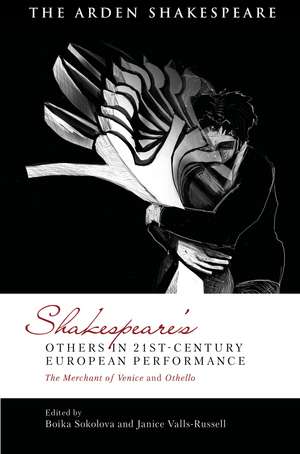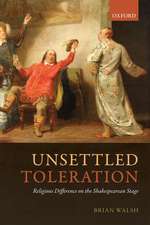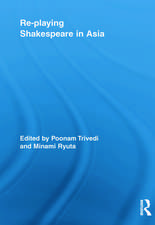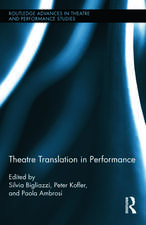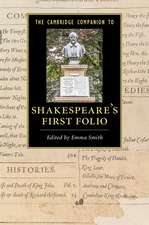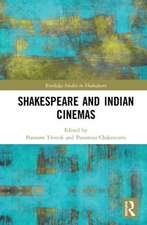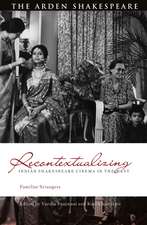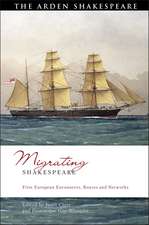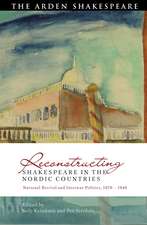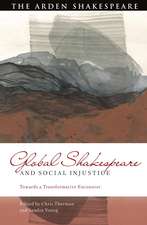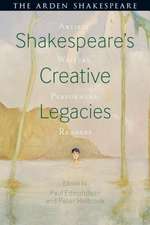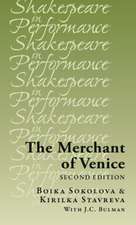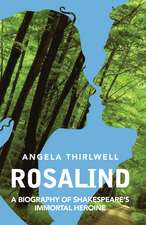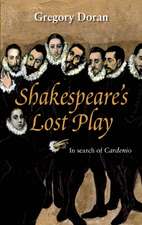Shakespeare’s Others in 21st-century European Performance: The Merchant of Venice and Othello: Global Shakespeare Inverted
Editat de Boika Sokolova, Janice Valls-Russell Dr David Schalkwyk, Silvia Bigliazzien Limba Engleză Hardback – 22 sep 2021
Preț: 538.36 lei
Preț vechi: 772.84 lei
-30% Nou
Puncte Express: 808
Preț estimativ în valută:
103.03€ • 107.17$ • 85.06£
103.03€ • 107.17$ • 85.06£
Carte tipărită la comandă
Livrare economică 12-26 aprilie
Preluare comenzi: 021 569.72.76
Specificații
ISBN-13: 9781350125957
ISBN-10: 1350125954
Pagini: 312
Dimensiuni: 129 x 198 mm
Greutate: 0.43 kg
Editura: Bloomsbury Publishing
Colecția The Arden Shakespeare
Seria Global Shakespeare Inverted
Locul publicării:London, United Kingdom
ISBN-10: 1350125954
Pagini: 312
Dimensiuni: 129 x 198 mm
Greutate: 0.43 kg
Editura: Bloomsbury Publishing
Colecția The Arden Shakespeare
Seria Global Shakespeare Inverted
Locul publicării:London, United Kingdom
Caracteristici
A timely study that offers a snapshot of current European theatrical engagements with Otherness through productions of two of Shakespeare's frequently studies plays at a time of mass migration and rampant nationalisms
Notă biografică
Janice Valls-Russell is Principal research associate (French National Centre for Scientific Research (CNRS), University Paul Valéry, Montpellier, France.Boika Sokolova teaches at the University of Notre Dame, USA, in England.
Cuprins
Notes on contributorsAcknowledgementsIntroduction Boika Sokolova (University of Notre Dame, London, UK) and Janice Valls-Russell (University Paul-Valéry, Montpellier, France)PART ONE Relocating otherness: the Other-withinInduction 1 Lawrence Guntner (Germany)1. 'Venice' is elsewhere: the Stranger's locality, or, Italian 'blackness' in twenty-first-century stagings of Othello Anna Maria Cimitile (University of Naples 'L'Orientale', Italy)2. Refracting the racial Other into the Other-within in two Bulgarian adaptations of Othello Boika Sokolova (Unoversity of Notre Dame, London, UK) and Kirilka Stavreva (Cornell College, USA)3. Estranged Strangers: Krzysztof Warlikowski's Shylock and Othello in African Tales after Shakespeare (2011) Aleksandra Sakowska (Shakespeare Institute, UK)4. Drags, dyes, and death in Venice: The Merchant of Venice (2004) and Othello (2012) in Belgrade, Serbia Zorica Becanovic Nikolic (University of Belgrade, Serbia)5. The Merchant of Venice in France (2001 and 2017): deconstructing a malaise Janice Valls-Russell (University Paul-Valéry, Montpellier, France)PART TWO New nationalisms, migrants: imperfect resolutionsInduction 2 Lawrence Guntner (Germany)6. 'Barbarous temper', 'hideous violence' and 'mountainish inhumanity': stage encounters with The Merchant of Venice in Romania Nicoleta Cinpoes (University of Worcester, UK)7. Staging The Merchant of Venice in Hungary: politics, prejudice and languages of hatred Natália Pikli (Eötvös Loránd University, Budapest, Hungary)8. Dutch negotiations with otherness in times of crisis: Othello (2006) and The Arab of Amsterdam (2008) Coen Heijes (University of Groningen, the Netherlands)9. 'Were I the Moor, I would not be Iago': radical empathy in two Portuguese performances of Othello Francesca Rayner (Universidade do Minho, Portugal)10. A tragedy? Othello and The Merchant of Venice in Germany during the 2015-2016 'refugee crisis' Bettina Boecker (University of Munich, Germany)PART THREE Performative propositionsInduction 3 Lawrence Guntner (Germany)11. The Merchant in Venice in the Venetian Ghetto (2016): Director Karin Coonrod in conversation with Boika Sokolova (University of Notre Dame, London, UK) and Kirilka Stavreva (Cornell College, USA)12. Inverting Othello in France (2019): Director Arnaud Churin in conversation with Janice Valls-Russell (University Paul-Valéry, Montpellier, France)13. Migrant Othello in Bulgaria (2020): Professor Plamen Markov in conversation with Boika Sokolova (University of Notre Dame, London, UK) and Kirilka Stavreva (Cornell College, USA)Coda: Staging Shakespeare's Others and their Biblical archetype Péter Dávidházi (Eötvös Loránd University, Budapest, Hungary)NotesBibliographyIndex
Recenzii
A balanced collection of well-selected essays and interviews that interrogate the cultural notions of the Other and offer highly relevant, topical and even moving insights.
These exhilarating essays chart the negotiations theatre-makers have conducted with two Shakespeare plays that seem now so especially problematic. Broad in their scope, always thoughtful in their investigations, their authors, whether scholars or theatre practitioners, have so much to tell us not only about Shakespeare but, even more importantly, about Europe's struggle to understand itself.
This rich and important synopsis of recent literary and cultural theory worked in and around particular interpretations of theatre practices is no mere esoteric study of a marginal corner of Shakespeare studies. It offers a great bank of ideas, images, and insights from which directors and scholars, in search of refreshment, in any part of the world, might, with great profit, draw out cultural capital. It supplements 'ego-centred' accounts of these with 'place-centred' analyses, and maps the ways that the foreign re-interprets the familiar. These anatomies of nationality, ethnicity, language, gender, migration, racial difference, marked and unmarked, demonstrate how those characters who have migrated into a Shakespearean heterocosm, virtual or theatrically rendered, provoke us to look beyond ourselves and probably uncover varieties of otherness within.
These exhilarating essays chart the negotiations theatre-makers have conducted with two Shakespeare plays that seem now so especially problematic. Broad in their scope, always thoughtful in their investigations, their authors, whether scholars or theatre practitioners, have so much to tell us not only about Shakespeare but, even more importantly, about Europe's struggle to understand itself.
This rich and important synopsis of recent literary and cultural theory worked in and around particular interpretations of theatre practices is no mere esoteric study of a marginal corner of Shakespeare studies. It offers a great bank of ideas, images, and insights from which directors and scholars, in search of refreshment, in any part of the world, might, with great profit, draw out cultural capital. It supplements 'ego-centred' accounts of these with 'place-centred' analyses, and maps the ways that the foreign re-interprets the familiar. These anatomies of nationality, ethnicity, language, gender, migration, racial difference, marked and unmarked, demonstrate how those characters who have migrated into a Shakespearean heterocosm, virtual or theatrically rendered, provoke us to look beyond ourselves and probably uncover varieties of otherness within.
